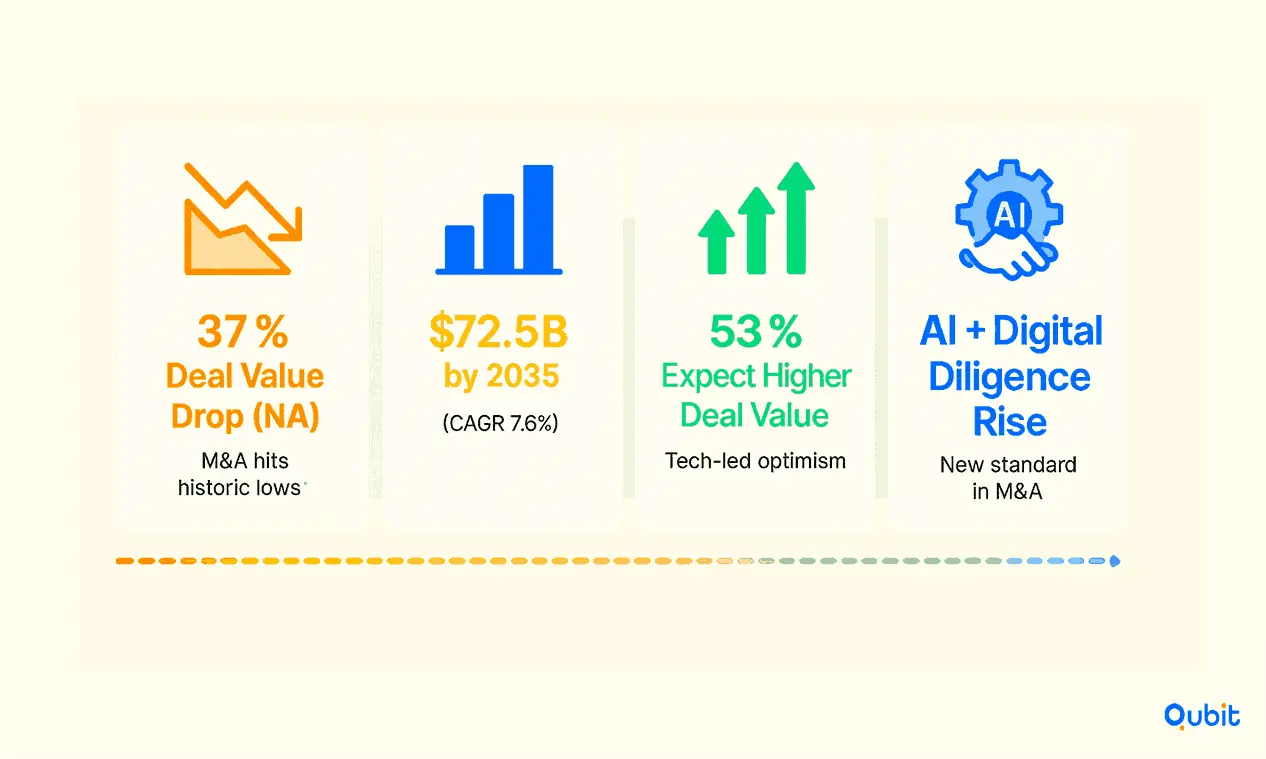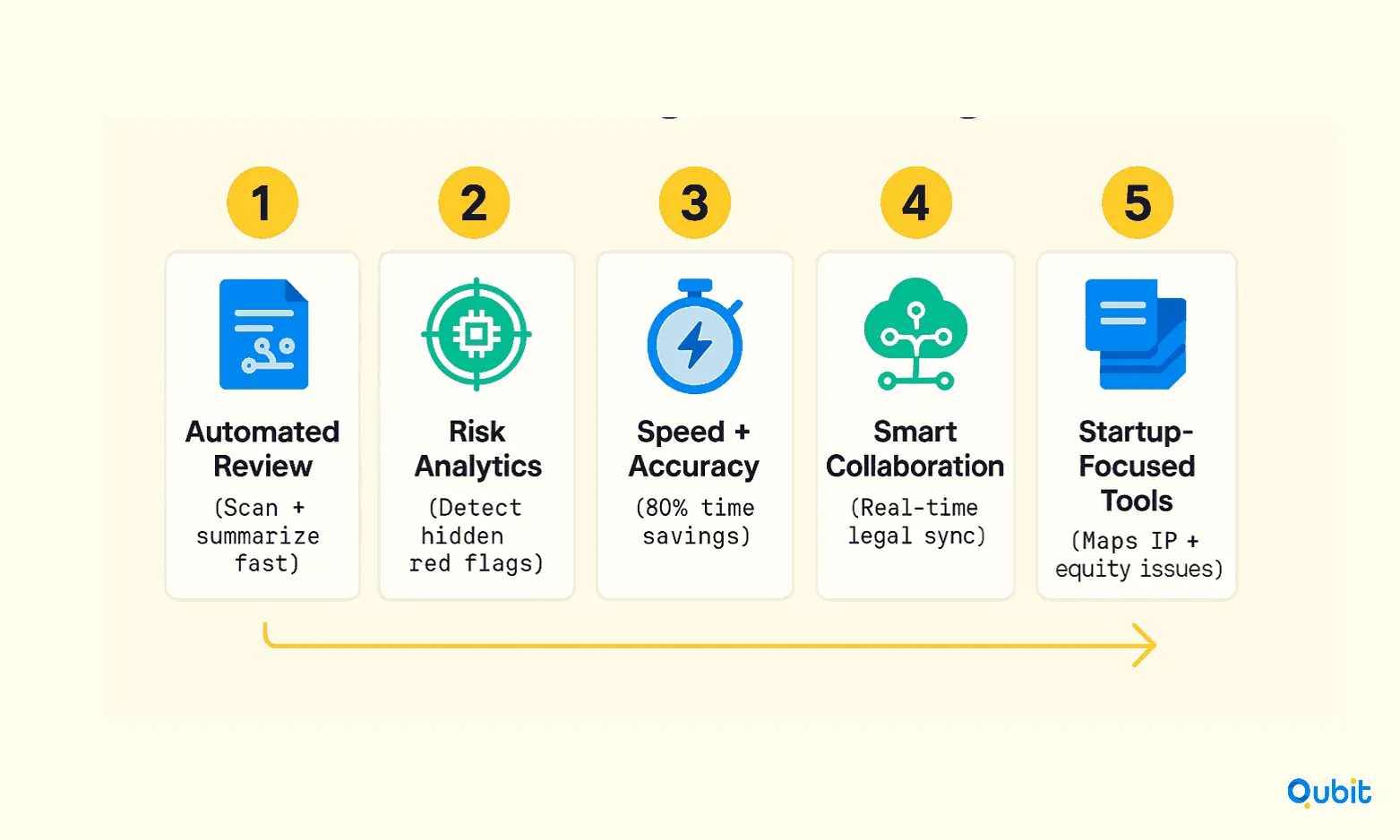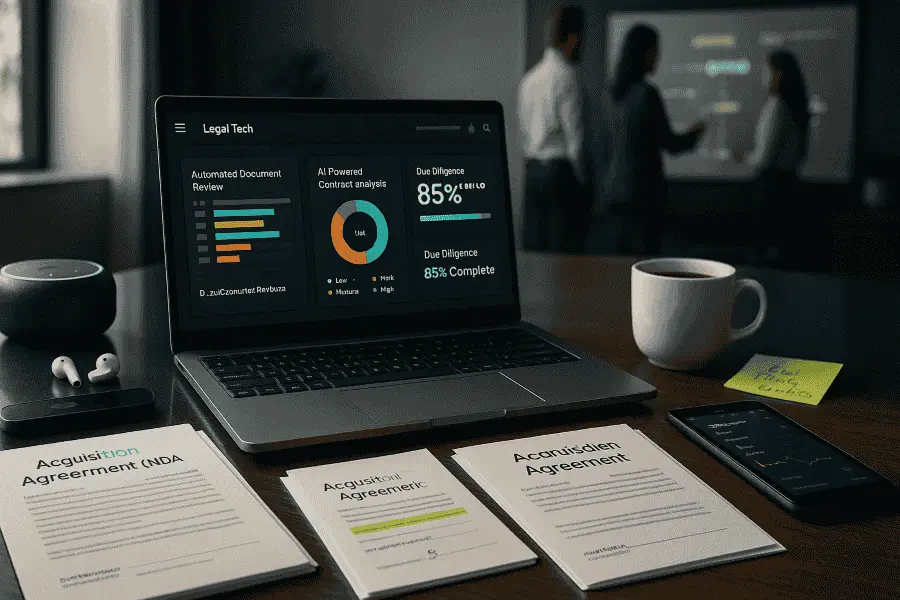Mergers and acquisitions (M&A) due diligence is a critical process for startups, often determining the success of a deal. However, traditional methods can be time-consuming and prone to human error, especially when handling vast amounts of data. Legal tech is transforming this landscape, offering startups and investors tools to streamline document review, automate compliance checks, and enhance decision-making.
While technology plays a pivotal role, it’s essential to consider the human element as well. A detailed discussion on cultural fit in startup acquisition underscores how team dynamics interact with legal technology during due diligence. By combining these insights, startups can ensure a smoother, more efficient M&A process.
This blog explores how legal tech is reshaping M&A due diligence and what startups need to know to stay ahead.
Overview & Market Trends of M&A and Legal Tech
Legal tech simplifies M&A due diligence by automating document review, improving accuracy, and reducing time for startups.
This section is for startup founders and investors preparing for M&A.
The intersection of legal technology and mergers and acquisitions (M&A) is transforming traditional practices. It offers streamlined processes and data-driven strategies. As global M&A activity faces record lows, with deal values dropping by 37% in North America alone, the adoption of digital tools has become essential for maintaining efficiency and accuracy.

Market trends reveal a significant shift: while traditional deal values decline, investments in legal tech are surging.Global growth in legal technology is accelerating. Legal tech market valued at £20+ billion and is expanding at 6–10% annually. This upward trend signifies increasing confidence and investment in digital transformation across law firms and corporations.
Corporate professionals are increasingly optimistic about tech-driven M&A, with 53% expecting tech deal values to rise and 38% anticipating higher deal volumes. As legal technology continues to reshape the M&A landscape, businesses must adapt to remain competitive and capitalize on emerging opportunities.
Public vs. Private Company Due Diligence Requirements
| Aspect | Public Company | Private Company |
|---|---|---|
| Disclosure Obligations | Extensive, regulated filings required | Limited, often negotiated disclosures |
| Regulatory Oversight | Subject to securities regulators | Fewer external regulatory requirements |
| Due Diligence Scope | Broader, includes public reporting | Narrower, focused on private records |
Intellectual Property, Cybersecurity & Data Due Diligence
IP due diligence, the process of systematically reviewing a company's intellectual property—serves as the cornerstone for assessing patent, trademark, and copyright value. For tech-driven transactions, IP due diligence serves as the cornerstone. It is key for assessing the value and validity of patents, trademarks, and copyrights.
Recent years show remarkable activity. Technology patent filings growing at 7.8% annually, with AI-related patents now 18% of all filings. This surge demonstrates evolving priorities in deal due diligence and sector innovation.
Beyond traditional IP assessments, integrating cybersecurity in M&A is equally critical. Cybersecurity audits uncover vulnerabilities that could jeopardize sensitive data post-transaction. Combining these audits with ESG compliance technology offers a holistic view.
ESG Compliance in Startup M&A Due Diligence
Building on cybersecurity and data audits, ESG compliance has become a vital aspect of M&A due diligence for startups. Investors increasingly require evidence that companies meet environmental, social, and governance standards before closing deals. This includes reviewing sustainability practices, labor policies, and governance structures to identify potential risks. Addressing ESG early can improve deal attractiveness and reduce the likelihood of post-transaction disputes.
To explore how intellectual property assessments intersect with legal tech tools, read more about IP and patent due diligence in startup acquisition.
How Legal Tech is Transforming Due Diligence

1. Automation of Document Review
Industry adoption is widespread. 2,500 LegalTech companies and 10,000 law firms now leverage tech for automated due diligence. This grounds the automation revolution in concrete market figures and demonstrates broad sector engagement.
Legal tech platforms powered by artificial intelligence (AI) and machine learning can ingest large volumes of documents in minutes. These systems categorize, extract, and summarize key clauses—such as change of control and assignment provisions—while providing traceability to source documents. This automation speeds up document review, allowing legal professionals to focus on strategic concerns.
2. Enhanced Risk Detection and Analytics
AI-driven tools analyze vast data sets to detect red flags such as undisclosed litigation, compliance failures, or intellectual property concerns that might be missed in manual reviews. Predictive analytics even enable early identification of potential liabilities or issues, allowing legal teams to make informed decisions quickly.
3. Improving Speed, Accuracy, and Cost-Effectiveness
Legal tech has revolutionized the M&A due diligence process. It offers a transformative approach to complex transactions.
For startups, where time is a critical resource, AI-based due diligence tools can cut review times by up to 80%. These solutions enable startups to meet tight deadlines without compromising thoroughness or quality, and can significantly reduce legal expenses, an important advantage for resource-constrained young companies.
4. Streamlining Collaboration and Compliance
Legal tech fosters collaborative and organized workflows. Automated checklists and audit trails keep all stakeholders, lawyers, investors, and founders, aligned. Tools for real-time compliance monitoring also make it easier to adapt to regulatory changes and maintain accurate records for post-merger operations.
5. Addressing Startup-Specific Due Diligence Challenges
Startups have distinctive due diligence hurdles: fragmented records, evolving IP portfolios, and fast-changing business models. Legal tech helps by:
- Mapping IP ownership and usage for tech startups
- Flagging anomalies in employment or equity agreements
- Integrating technical and legal findings to ensure technology readiness and compliance
Technology Due Diligence Checklist for Startups
- Conduct a full inventory of software, hardware, and cloud assets to identify all technology components involved in the transaction.
- Scan source code for vulnerabilities, technical debt, and open-source license compliance to prevent post-deal surprises.
- Review all software licenses and anti-assignment clauses to ensure legal transferability and avoid costly audit risks.
- Assess cybersecurity posture, including incident response plans and historical breaches, to gauge operational resilience.
- Evaluate the technical team’s expertise, organizational structure, and retention risks to support successful integration.
Recent acquisitions signal major advances. Filevine’s contract redlining acquisition in 2025 expanded their AI capabilities. This strategic move demonstrates practical integration of cutting-edge automation in legal tech due diligence.
Key Benefits for Startups
- Speed: Shortened review cycles improve deal execution and attractiveness to acquirers.
- Accuracy: Fewer manual errors reduce risk and potential disputes.
- Cost Savings: Reduces hours billed by external legal advisors.
- Regulatory Readiness: Real-time tools minimize the risk of regulatory oversights.
Understanding the Human Element
While legal tech offers speed and precision, the human side of M&A, especially cultural fit, can make or break a transaction. Cultural due diligence evaluates whether two teams share compatible values, communication styles, and business objectives. Even the best automated tools cannot replace the nuanced understanding that comes from engaging leadership, facilitating open dialogue, and observing day-to-day interactions.
Technology’s Role in Cultural Assessment
Modern legal tech platforms are beginning to offer survey tools, sentiment analysis, and value-alignment diagnostics during due diligence. Automated platforms can administer anonymous surveys and analyze anonymized communication data to identify potential integration issues, enabling acquirers to flag concerns around collaboration, leadership styles, or organizational priorities early in the process. However, these tools serve best as a complement to hands-on management interviews and cultural workshops.
Case Example: Integrating Tech with Culture
A recent acquisition in the SaaS sector underscored this point: while compliance checks and contract reviews were completed in record time using AI-powered legal tech, the real win came from using collaboration platforms to introduce teams, share integration plans in real time, and proactively resolve cultural differences. This blended approach minimized disruption post-acquisition and accelerated value creation for both sides.
Implementation Challenges and Considerations
Integrating Legal Tech: Pitfalls and Mitigations
While legal tech adoption delivers substantial benefits, startups should anticipate and plan for several implementation challenges:
- Data Security & Privacy: With more sensitive information moving to digital platforms, maintaining robust cybersecurity is critical. Choose vendors with strong encryption, compliance certifications, and demonstrated incident response procedures.
- Change Management: Training stakeholders, founders, legal teams, and investors, in new systems is essential. Resistance to change can slow adoption, so clear communication of benefits and ongoing support is crucial.
- Cost vs. Value: Not all tools deliver equal ROI. Start with pilot programs to identify the most effective solutions and avoid overinvestment.
- Compatibility: Integrate legal tech solutions that work with your existing software suite (e.g., CRM, virtual data rooms), ensuring smooth data flow and user adoption.
Checklist for a Successful Transition
- Evaluate your firm’s or startup’s pain points before selecting tools.
- Run training sessions and create user manuals.
- Appoint internal champions to guide adoption and collect feedback.
- Monitor KPIs, such as review time and error rates, to measure impact.
Where Legal Tech & M&A Due Diligence Are Heading
AI, Blockchain, and Beyond
The next wave of legal tech promises even greater disruption:
- AI-enhanced Predictive Analytics: Tools are maturing to anticipate negotiation sticking points, forecast regulatory risks, and auto-suggest deal structures.
- Blockchain for Transaction Integrity: Immutable ledgers may soon underpin M&A documentation, simplifying audit trails and post-deal dispute resolution.
- Smart Contracts and CLM (Contract Lifecycle Management) Evolution: Next-gen contract lifecycle management tools will enable automated execution of agreement milestones and real-time compliance verification.
Conclusion
Legal tech has revolutionized the M&A due diligence process. It offers a transformative approach to managing complex transactions. By integrating advanced tools, businesses can achieve unparalleled efficiency, mitigate risks, and make data-driven decisions with confidence. These strategies not only streamline workflows but also empower teams to focus on critical insights rather than manual tasks.
As you consider optimizing your M&A processes, embracing these innovations can be the key to staying competitive in a dynamic market. If you're looking to secure the right investors with data-driven insights, we invite you to explore our Investor Discovery and Mapping service. Let’s get started.
Key Takeaways
- Legal tech is transforming M&A due diligence by reducing deal times and enhancing accuracy.
- Market trends indicate a significant shift towards digital solutions with strong growth projections in the LegalTech sector.
- Adoption of AI and CLM tools can dramatically cut deal time and streamline processes.
- Firm-wide applications improve internal collaboration and operational efficiency.
- Robust IP, cybersecurity, and data due diligence are essential for safeguarding assets post-transaction.
Frequently asked Questions
How does AI enhance M&A due diligence for startups?
AI enhances M&A due diligence by automating large-scale document reviews, identifying risks, and increasing accuracy and speed for startups.






